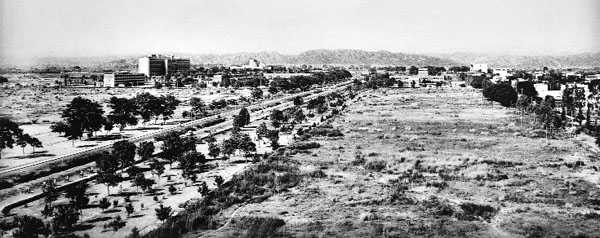In Chandigarh since 1955
Jupinderjit Singh
Walls and wide roads don't make a city, people do,” stresses Ranbir Kaur Talib, one of the first residents of Chandigarh. She arrived here when the city was like a baby struggling to stand on its feet.
A conversation with her takes you back to the time when bushes greeted visitors in most of the sectors, but the breeze was pure and light, the Sukhna Lake was deep and full of water all months of the year and “people were courteous to each other”.
“Hun saah nahi aunda (It is difficult to breathe comfortably)," she says. “There are too many people in the city now and too many houses and vehicles. It used to be so open and wide earlier.”
Originally a resident of Kolkata, she came here in 1955-56 when her father (a former associate of Netaji Subhas Chandra Bose and a transporter by profession, who later became the Minister) was invited by the Punjab government to live in the city. “Such is the quirk of fate. Earlier, the Administration was inviting people and now people scurry for any available space in the city,” she says.
“We were the first to start building a house in Sector 2. On the first visit, we could locate the 2-kanal plot with much difficulty as the small pillars denoting the number of the plot were covered with wild growth,” she recalls.
At that time, only parts of Sectors 22 and 23 had come up, “The Sector 17 market had developed. We even used to walk to that place. I miss those walks. The city had a web of 'pagdandis' (unpaved trails) through the sectors. Even though wild growth was rampant, women could go alone or in small groups. Now, snatchers and eve-teasers are on every street,” Ranbir Kaur rues.
But, her love for the city remains intact. "What I like is that it is still far better than others. The green cover and the sense of duty towards the city among the senior citizens, the original inhabitants, is what keeps me going," she says. A member of several social organisations, Ranbir Kaur talks about help groups which are trying to keep the spirit of Chandigarh alive.
The city has got crowded in the last 10 years or so, she says. “It used to have a soul. Everyone would think they were part of construction of the most beautiful city in the country. They felt a sense of ownership. Now, people are ruining it. They do not consider themselves to be stakeholders. Living in a city like Chandigarh calls for a certain sense and notion of citizenship. No one is teaching them that. The Administration has turned a blind eye to crime and safety of women. Parks are not being maintained properly. The city had a culture of a clean, suave and stable life. It seems all gone.”
Ranbir Kaur Talib also has a question for the administration: why have the roundabouts been removed? “The rotaries were beauty spots. Now they are talking about bringing the Metro. It will run in the same place. And cause more chaos and noise. I miss the quietness of the place .”
Not far from where Ranbir Kaur Talib lives is the residence of Opinder Kaur Sekhon. The Sector 3 resident had come to the city as a student in 1982. She made the place her home .
“The politics over its ownership between Punjab and Haryana was at its peak. Notwithstanding the controversy over its ownership, I loved the open spaces the city offered. It widens your horizon, thinking. At that time, pathways were more used. Now, you rarely see anyone choosing to walk to a destination. Now, my heart races just at the thought of finding space to park the vehicle,” she says. “ The entire city was a geri route unlike the one popular among youngsters now. People were constructive, talked of nation-building, not of passing time in an educational institution or just loitering around.”
Sekhon still finds Chandigarh a city which offers a lot. “You can do what you want. You can pursue your field of interest, your hobbies and passion here. The city is getting congested but still it gives you a feeling that you are living in a place unlike any other.”And that feeling, she says, should be the trigger for all — residents and officials — to get their act together.
“The officials managing the city should become more pro-active in maintaining its beauty. What is the point of holding meetings in the peak of summer for revival of the lake? The planning to ensure supply of water from Bhakra canal or other places should start in February or March itself.”









